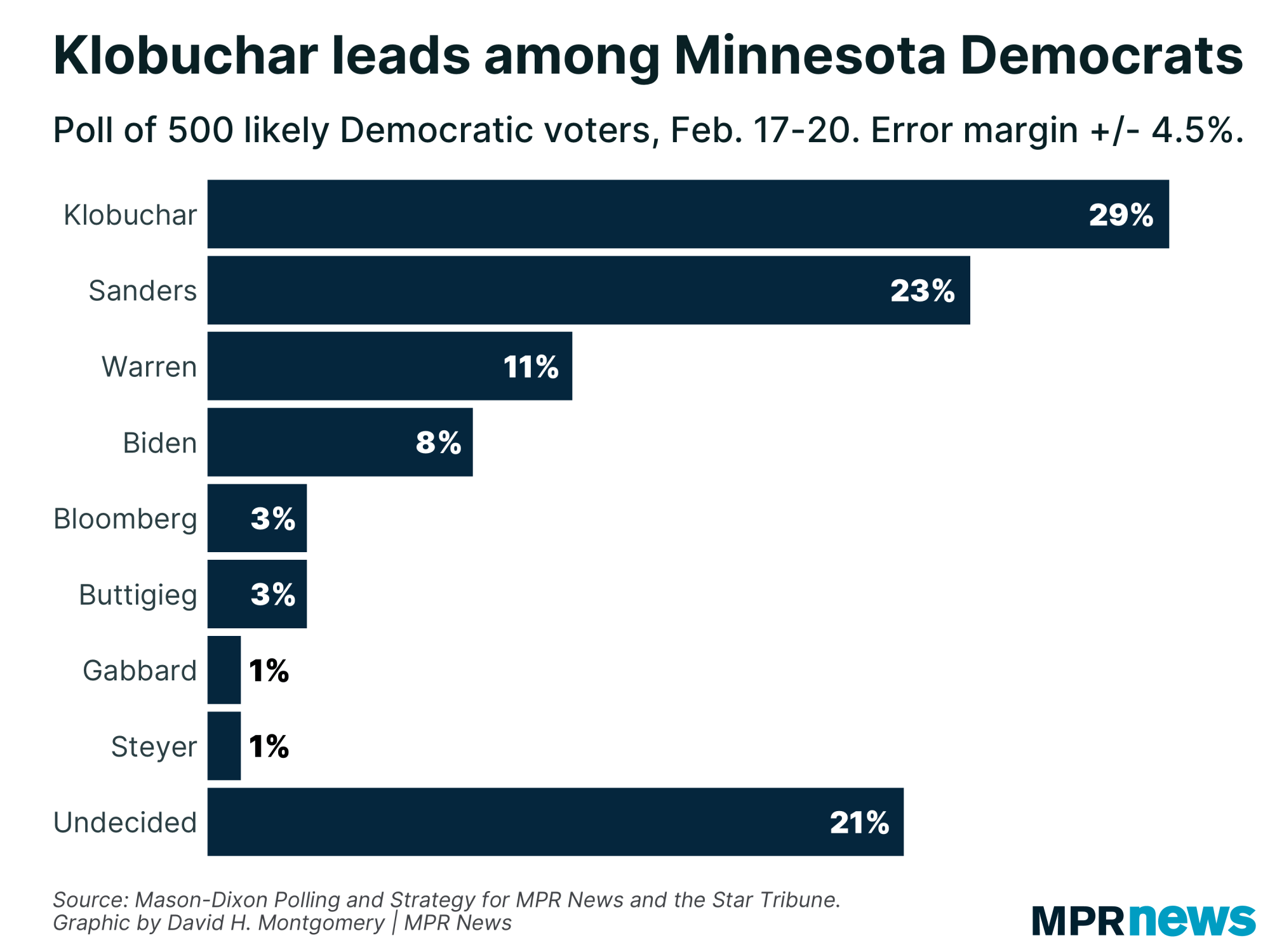MPR News/Star Tribune poll: Klobuchar has edge in primary

Go Deeper.
Create an account or log in to save stories.
Like this?
Thanks for liking this story! We have added it to a list of your favorite stories.
Minnesota Sen. Amy Klobuchar enjoys a slight edge as her home state’s presidential primary nears, according to a new MPR News/Star Tribune Minnesota Poll that shows plenty of likely voters still haven’t decided.
Klobuchar is out front with 29 percent support, followed by fellow Sen. Bernie Sanders at 23 percent and Sen. Elizabeth Warren at 11 percent. All of the other candidates are in single digits.

One in 5 respondents said they were undecided.
DFL Party Chair Ken Martin, who is publicly neutral in the race, sums it up this way:
Turn Up Your Support
MPR News helps you turn down the noise and build shared understanding. Turn up your support for this public resource and keep trusted journalism accessible to all.
“No one knows for sure what the landscape is going to even look like by the time we get to March 3. This is very fluid,” he said. “Every single day, every single hour, this race changes.”
The Super Tuesday election will be Minnesota’s first presidential primary since 1992, replacing the state’s modestly attended precinct caucuses as the state’s chance to weigh in on nomination contests. President Trump occupies the sole spot on the Republican primary ballot, with write-ins permitted.
The poll offers a glimpse at how the Democratic race is shaking out so far in Minnesota.
Mason-Dixon Polling and Strategy reached 500 likely Democratic primary voters on a landline or cellphone between Monday and Thursday. The poll has a margin of sampling error of plus or minus 4.5 percentage points.
Klobuchar has handily won three Senate elections in Minnesota, so voters know her well.

That’s comforting to people like Mary Jane Quinlan, a retired salesperson who lives in Minneapolis.
“I think she’s level-headed. She’s intelligent. She really knows what’s going on and she can negotiate with all people on all sides. She remains calm, doesn’t take offense,” Quinlan, 69, said. “She really listens to what’s going on and comes back with intelligent answers.”
Quinlan said she worries about the Democratic Party turning off independent voters if a nominee is too easily pegged as extreme.
“They’re so out in left field that everybody thinks we’re all just crazy,” she said.
Bob Brophy, 44, lives in Chanhassen and until recently voted mostly for Republicans. But the financial underwriter for the insurance industry plans to vote for Klobuchar.
“She is a centrist candidate, a moderate candidate. I think she can unite the country,” Brophy said. “And I think she has the best chance of beating Donald Trump in a general election.”
Although Brophy likes the current strength of the U.S. economy, he’s bothered by President Trump’s character and inflammatory rhetoric.
Here’s the catch: Brophy won’t automatically vote Democratic in the fall, particularly if Sanders is the nominee because of his stances on health care and taxes.
“It’s probably the only thing that would actually encourage me to vote for Donald Trump in the next election, as repugnant as it might be for me,” he said.
Shawn O’Keefe, of Oakdale, likes Sanders and his consistency. He supported Sanders in his 2016 run but voted for a third-party candidate in the general election.
“In debates, he’s a lot less prone to just go and attack the others,” O’Keefe said. “He wants to focus on the issues and what actually matters.”
O’Keefe is a 26 year-old Marine veteran who works at a precision manufacturing plant. He supports Sanders' signature “Medicare For All” proposal and said people need to realize that a big bite of their pay is going for health care now.
“I feel that I would actually end up spending less money because then it would all be consolidated and I’d imagine that they would be able to get a lot better pricing my health insurance,” O’Keefe said.

The big pool of undecided voters — 21 percent — could very well determine who comes out on top.
College professor Matthew Vorell is in that camp. He lives in St. Cloud and is torn between Klobuchar and former Mayors Michael Bloomberg and Pete Buttigieg. Vorell said he’s hunting for the one most likely to win in November.
“I think electability is the key phrase,” Vorell said. “It seems like that was a big thing when Trump got elected. It was his electability, his showmanship.”
Vorell said substance matters, too — a candidate’s record and ideas. He’s most interested in the next president taking bold steps on climate change.
“Because if we don’t have a climate, if we don’t have an environment, we don’t have, in my opinion, anything else,” Vorell said.
Climate is also the top concern of Maggie McDermott, another college professor from Winona. She trusts Warren to address that and other important issues, such as combating influence and corruption in government.
“She and her ideals resonate with me,” McDermott said.
McDermott said her support for Warren was reinforced by a strong debate showing last week.
“So, I think she’s kind of got this balance of being respectful but also holding people accountable for what they’ve said and their behaviors,” she said.
There's still one more televised debate and likely a few twists yet to come before Minnesota voters have their say on March 3.
MPR News data reporter David H. Montgomery contributed to this story.



